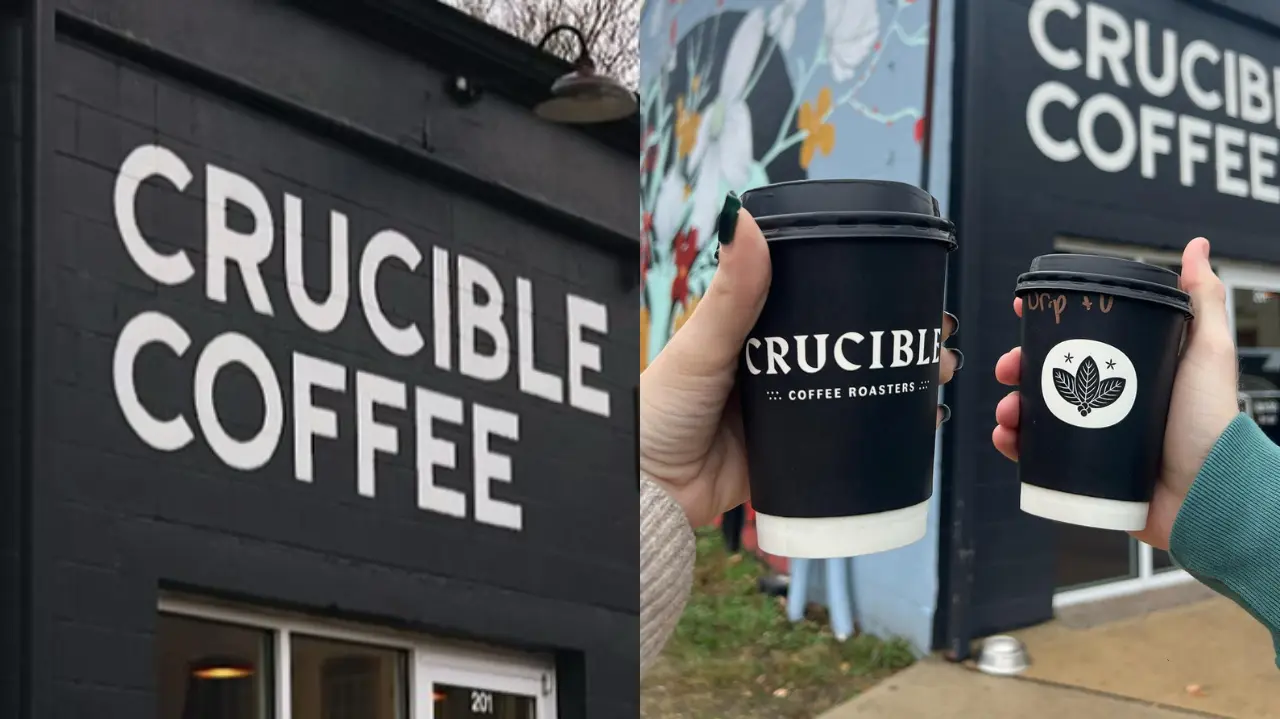Craving coffee that’s more than just a caffeine fix? Crucible Coffee Roasters turns beans into bridges between people.
Since 2019, this veteran-owned spot in Staunton, Virginia, has redefined what a coffee shop can be. Forget stale brews and silent sips; here, every cup sparks conversation.
This guide isn’t a dry list of facts. We’ve combed through their story, sipped their signature blends, and chatted with regulars to give you the real roast.
You’ll discover their small-batch magic, their obsession with ethical sourcing, and why locals call it “the living room of Staunton.”
Straight from their team and the community, fresh details were updated as of Friday, May 24, 2025. Ready to taste the difference?
Historical Context and Founding Story
In 2019, Brandon Bishop and Kean Ivey looked at a crumbling auto garage in Staunton, Virginia, and saw something radical: a future café.
Not just any café, a place where coffee could unite people like craft beer does. They chose Staunton’s historic downtown, steps from Lewis Creek, for its soul.
Old brick buildings, bustling farmers’ markets, and neighbors who still wave hello. The News Leader captured their vision in 2019: “A space where the ritual of coffee becomes a reason to linger, not rush.”
The name “Crucible” wasn’t picked lightly. Their website explains it’s a nod to the fiery vessels transforming raw metals into something more substantial.
For them, the shop is that melting pot where strangers become friends over Ethiopian pour-overs, and baristas remember your usual.
Brandon once joked, “We’re part coffee shop, part town square.” That garage? Now, it’s all warm wood tables, the scent of roasted beans, and the buzz of conversations that outlast the coffee in the cup.
Founders’ Backgrounds
Brandon Bishop didn’t just serve coffee; he studied it. Born in the South, he started as a barista in 2010, but his real education began overseas.
By 2015, he was helping a coffee company expand into Saudi Arabia and Japan. He watched locals treat coffee shops like second homes in Tokyo, where politeness met passion.
That stuck. “Coffee doesn’t just wake you up,” he says on Crucible’s site. “It wakes up conversations between strangers.”
Then there’s Kean Ivey. He and Brandon met as teens, but life took Kean to war zones first. After two Army tours, he swapped combat boots for an espresso machine, working as a college barista.
Later, in Colorado, he joined a roasting giant. He geeked out in cupping labs there, dissecting flavors like a sommelier. Precision from the military? It became his roasting mantra.
They’re an unlikely blend; Brandon’s global hospitality meets Kean’s structured craft. But that’s the point. At Crucible Coffee, discipline and warmth brew side by side.
Mission and Values
At Crucible Coffee, the mission isn’t a plaque on the wall; it’s in every handshake and every freshly ground bean. They call it “relentless pursuit,” but it’s simpler: Make coffee that matters.
For them, that means three things. I love the craft. Honor the people. Build bridges, not just brews.
Southern roots shine here. Think porch swings and sweet tea, but with espresso machines.
They blend tradition, like time-worn recipes, with bold ideas, like partnering with Guatemalan women farmers. Hard work? It’s in the calluses on their roasters’ hands. Craftsmanship? That’s why a latte takes 30 seconds longer to nail the swirl.
And the “crucible” metaphor? It’s alive. Walk in on a Saturday morning. Teachers debate novels beside construction workers.
Coffee Offerings
Every bag tells a story at Crucible Coffee, whether a rare bean from Mount Kilimanjaro or a blend empowering Guatemalan farmers.
Let’s unpack their standout roasts, praised by regulars and critics alike.
| Coffee Name | Origin/Details | Flavor Notes | Unique Features |
| Tanzania Peaberry | Mount Kilimanjaro, peaberry beans | Black tea, orange, peach | Bright, vibrant, customer favorite |
| Ella | Guatemala, female-owned farms | Brownies, candied pecans, milk chocolate, tropical fruits | Supports ethical sourcing, sweeter profile |
| Iron Horse Steeped Coffee Bags | Nitro-sealed, compostable packaging | Varies by blend, typically robust | Convenient for travel, eco-friendly |
Tanzania Peaberry: Imagine sipping coffee that tastes like sunshine. Sourced from the volcanic slopes of Mount Kilimanjaro, this rare peaberry, a natural mutation found in just 5% of coffee cherries, packs a punch.
It’s round, dense beans brew into a cup that’s bright and tea-like, with whispers of ripe peach and zesty orange.
Coffee lovers rave about its “coffee-tea marriage” and how a single bag stays fresh for 2-3 weeks, making every sip a slow, delicious farewell. Perfect for pour-over or espresso, the roast turns first-timers into regulars.
Ella: This isn’t just coffee; it’s a movement. Sourced from women-led farms in Guatemala, Ella celebrates the unsung heroes of coffee cultivation.
The blend dances between sweetness (brownies and candied pecans) and a subtle tropical twist.
While black coffee drinkers might find it bold, adding a splash of milk unlocks its milk chocolate warmth. As one reviewer said, “It’s not my usual, but supporting these women? That’s the real flavor”.
Iron Horse Steeped Coffee Bags: For adventurers who refuse to compromise. These nitro-sealed bags are like tea bags for coffee lovers, just steep in hot water and go.
Though not as robust as a French press, they’re lifesaving on camping trips or rushed mornings. Pro tip: Use boiling water for a richer brew, and toss the compostable packaging guilt-free.
Roasting Process
The roasting process at Crucible is both a science and an art, using a 12-kilo Probat roaster in a 900-square-foot roastery adjacent to their 1,200-square-foot café, as detailed in a 2019 Daily Coffee News article.
This visibility to patrons adds an educational element, with the article noting limited roasting presence in the area, making it a draw.
Roasting involves monitoring temperature and time to develop desired flavors. Lighter roasts preserve acidity and fruity notes, while darker roasts enhance richness, as their website explains.
This process ensures each batch, roasted in small quantities, maintains peak freshness, a key factor in their quality commitment.
Customer Experience
Step into Crucible Coffee at 300 Church St, Staunton, and you’ll feel the hum of a space designed for belonging immediately.
Exposed brick walls meet reclaimed wood tables, softened by hanging plants and the warm glow of pendant lights. It’s industrial but inviting, like a friend’s loft where you’re always welcome.
Staunton locals know that mornings here start with construction workers grabbing drip coffee alongside professors grading papers.
By noon, the sunlight spills through tall windows, illuminating freelancers typing away and friends debating over cortados.
The magic isn’t just in the design. Baristas here don’t just take orders; they learn your name. “We had a regular who only drank iced coffee, even in January,” laughs one staffer. “We’d prep his cup when we saw his truck pull up.”
The menu keeps it simple but thoughtful. Pair their velvety lattes with a buttery croissant from Paris Cake Company, or try Hugo Tea’s jasmine green blend for a floral counterpoint.
Most leave with more than a caffeine buzz. Regulars swear by taking home a bag of beans, “It’s like bottling the shop’s energy,” one says. Open daily from 7 AM to 5 PM, Crucible Coffee isn’t just a stop.
Community Engagement and Collaborations
Take their Nitro Coffee Stout, a collab with Rockbridge Vineyard & Brewery. This isn’t just beer with coffee tossed in.
It’s a dialogue, roasted malt mingling with Crucible’s beans, creating a smooth, coffee-forward stout (6.5% ABV, 30 IBUs) that turned even non-stout drinkers into fans.
The partnership, born in 2019, wasn’t just about flavor. It was about bridging coffee lovers and craft beer regulars, proving that shared tables foster shared stories.
Then there’s Ella, their Guatemalan blend. Every bag supports women who grow the beans and farmers who’ve battled discrimination to own land and lead.
One customer said, “Buying Ella feels like tipping your hat to the women who made it possible.” It’s coffee as a quiet revolution, blending milk chocolate sweetness with a cause.
But Crucible’s roots dig deeper. As a veteran-owned business, they’ve turned their shop into a hub for vets swapping stories over espresso.
Kean’s military discipline? It’s in the precision of their roasts. Brandon’s Southern hospitality? It’s why baristas remember your dog’s name.
They’ve also teamed up with Reunion Bakery, serving espresso beside buttery pastries, a nod to Staunton’s small-business camaraderie.
This spring, they’re launching Baldwin Brews with Mary Baldwin University, bringing locally roasted coffee to campus because students deserve more than stale dining hall brew.
Why Choose Crucible Coffee
Big coffee chains? They’re like fast food. Quick, predictable, same. Crucible Coffee? It’s the slow-cooked meal your grandma makes, crafted with care, meant to be savored.
Here’s why they’re rewriting the coffee rulebook.
Freshness That’s Not Just a Buzzword
While Starbucks beans might sit on shelves for months, Crucible’s small-batch roasts hit your doorstep within days.
Think of it this way: their Tanzania Peaberry is like a just-picked apple, crisp and vibrant, while mass-market blends taste like fruit left in the sun.
Research shows that roasted beans lose their peak flavor quickly within 2-4 weeks. Learn more about how to roast coffee beans for optimal freshness.
Crucible’s local roasting ensures you’re sipping beans at their prime, not their expiration. One customer joked, “They’re roasting just for me.”
Ethics You Can Taste
Big brands talk sustainability; Crucible lives it. Their Ella blend isn’t just coffee; it’s a paycheck for Guatemalan women fighting for land rights.
Compare that to chains sourcing beans through faceless intermediaries. Even their compostable steeped bags scream intentionality: “Campfire coffee shouldn’t trash the planet.”
Meanwhile, giants like Dunkin’ still rely on plastic pods clogging landfills.
Community, Not Transactions
Walk into a Starbucks, and you’re a customer. At Crucible, you’re family. Baristas memorize orders (yes, even the “half-caf, oat milk, extra hot” crowd).
Their collab with Rockbridge Brewery? It’s not just about beer; it’s about merging coffee nerds and craft brew fans into one chatty tribe.
Staunton locals call the shop “the living room we all share,” a far cry from the sterile counters of chain cafés.
Innovation Without Gimmicks
While chains push pumpkin-spice everything, Crucible’s steeped coffee bags solve real problems: “Forgot your French press? No sweat.” It’s practical genius, not flash.
Compare that to Dutch Bros’ sugar-bomb concoctions, innovation as a distraction, not a solution.
Their veteran-owned status isn’t a marketing ploy; it’s in the DNA, shaping their disciplined roasting and community-first ethos.
The Price of Values
Sure, a Crucible latte costs more than 7-Eleven sludge. But here’s the kicker: that extra dollar supports farmers, funds local partnerships, and keeps Staunton’s historic downtown alive.
As global coffee prices hit record highs, chains hike costs to pad profits. Crucible? They’re upfront: “Pay more because we care more,” and regulars gladly do.
In a world of $10 lattes and AI-driven loyalty programs, Crucible Coffee stands apart. It’s not just coffee; it’s a statement.
Brewing Tips for Crucible Coffee Enthusiasts
Unlock the full potential of your Crucible Coffee beans with these pro tips; no barista diploma is required. Let’s start with the basics: your water matters.
Always use filtered. Tap water’s chlorine or minerals can mute those delicate peach notes in Tanzania Peaberry or muddy Ella’s chocolatey depth.
Drip coffee lovers, listen up. This isn’t your gas station brew. For busy mornings, grind Crucible’s beans medium-coarse. Learn how long to grind coffee beans for the perfect consistency.
Why?
It prevents bitterness when hot water rushes through. Craving something bolder? Try the French Press.
Add coarse grounds, pour hot (not boiling!) water, and let it bloom; 30 seconds of waiting lets gases escape, smoothing the flavor. Press slowly; patience rewards you with a velvety cup.
Pour-over devotees, this is your moment. Grab a V60 or Chemex. Medium-fine grind. Circular pours, steady hands. Target 3-4 minutes total.
This method loves single-origins like Tanzania peaberry and bright citrus pops when water dances through the grounds.
Got an espresso machine? Ella’s your blend. Its sweetness shines under pressure. Tamp firmly and pull a 25-second shot. Too bitter? Grind coarser. Too sour? Finer. Adjust like a pro.
No gear? No problem. Cold brew is foolproof. Mix coarse grounds with cold water (1:4 ratio) and steep for 18 hours. Strain, dilute, and pour over ice.
Perfect for Virginia summers. For those looking for convenience on the go, you might also consider exploring how to use a Keurig coffee maker for quick brewing.
And those Iron Horse-stepped bags? Camping hack: reuse the bag twice. First, steep for boldness, second for a lighter sip.
Remember, Crucible Coffee isn’t just beans; it’s a canvas. Play. Experiment. Burn a batch? They’ll laugh with you, not at you. Because here, every “oops” is just a step toward your perfect cup.
Conclusion
Crucible Coffee Roasters isn’t just a brand; it’s a heartbeat. From that resurrected auto garage in Staunton to your morning mug, every bean carries a legacy of grit and grace.
Think about it: coffee that fuels farmers in Guatemala, brews that bridge craft beer fans and espresso addicts, and a shop where even the walls seem to hum with stories.
Their secret? They treat coffee like a verb, not a noun. It’s something you do slowly, thoughtfully, together.
Whether you’re sipping Ella’s chocolatey warmth or camping with Iron Horse steeped bags, you’re not just drinking. You’re joining a chain of growers, roasters, and dreamers who believe coffee can change more than your energy level.
So here’s your invite: Taste the difference. Let Tanzania Peaberry’s peach notes wake you better than any alarm clock. Linger over a latte at their sunlit Staunton shop.
Or brew a bag at home, knowing your purchase lifts someone’s tomorrow.
Crucible Coffee proves one thing: great coffee isn’t just made. It’s lived.




